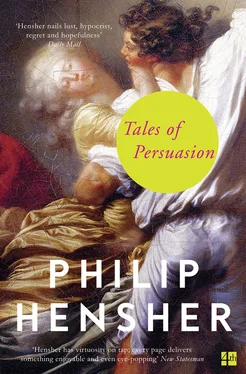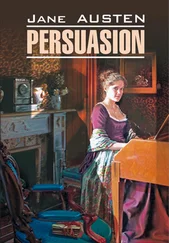‘I don’t like it,’ I said.
There was a pause before the boy realized we were waiting for his answer.
‘We’ve run out,’ he said. ‘The delivery comes at three, I think.’
‘Nonsense,’ Mrs Quincy said. ‘How can you have run out? I want to talk to the manager. Fetch me the manager immediately.’
The boy disappeared.
‘The trouble with the English,’ Mrs Quincy said very distinctly, attracting some attention from passing shoppers, ‘is that they never complain. Or they never complain at the right time. They sit around whining endlessly when nothing can be done about a problem, and then when they’re offered the chance, they sit quietly. I’ve often noticed it. If you don’t say anything, you don’t get anything.’
‘How’s the professor?’ I said, in order not to respond. ‘And the children? I so enjoyed dinner the other night.’
‘Oh, God,’ Mrs Quincy said cryptically. ‘Here he comes.’
She meant the manager, not the professor. The manager looked, frankly, too grand to be troubled with these things. He was approaching in his suit and tie, the original boy tagging along behind, his face purply embarrassed. He had never had to ask the manager anything directly before, and was now wondering, I guessed, whether he should have done so. But Mrs Quincy had worked herself up into a lather over someone else’s dairy purchases, and she was going to have her moment.
‘I understand that there’s a problem here,’ the manager said.
‘There is a problem,’ Mrs Quincy said. ‘Now, look at these shelves. You have six-pint containers of milk. You have four-pint containers of milk. And those are very well and good for someone such as I, with a family who drinks milk all day long. But look again and ask yourself whether you see single pints of milk. No. You do not. And for many people a single pint of milk is what they need. Now, this is my friend and he lives on his own. He lives in a bedsit. He has few friends and he never cooks. He lives on takeaways and similarly unhealthy things. But he likes a cup of coffee in the morning or sometimes a cup of tea. And it takes him probably five days to finish even one pint of milk. What is he going to do with a gigantic carton like this? He would never finish it. He would find it turning to cheese before he was halfway through it. And he’s paid four times as much as he wanted to for it, which, considering that he’s living on a very restricted budget, is not a trivial matter. Listen to me. Where are the single pints of milk for the single lonely people in this town? Where are they?’
‘We’ve got delivery problems,’ the manager said, as I made faint noises of demurral and objection to this poignant but honestly insulting account of my life.
‘What rubbish,’ Mrs Quincy said. She was delighted. ‘Now come along with me. Have you finished here? Will you ever. Do your shopping.’ (Over the shoulder.) ‘Here. Again?’
‘Well,’ I began, drawn along in Mrs Quincy’s wake.
‘The thing is,’ Mrs Quincy said, once we were in her car – it seemed a done deal that I was being whisked off by her, though whether she was generously offering me a lift home or abducting me was unclear, ‘Silvia’s really a sort of family. Well, not family at all. But Richard, my husband, you know, she’s the neighbour of a cousin of his in Florence.’
‘In Florence?’ I said. ‘I thought she came from Cremona.’
‘Comes from Cremona, ran away, very naughty, but it’s all made up now, lives in Florence in a flat next to Aunty Paulina. I say aunty, but let me get this straight. Richard’s sister’s second husband, his stepmother, it was her niece. Half-niece, is there such a thing, because of course their mother, who was married to the stepmother’s brother and used to be a McIntyre, one of the Mount Isa McIntyres, if you can imagine such a thing, she met a Melbourne dentist and moved to Melbourne with relief and married him, and that was Paulina’s father. Didn’t work out but she stayed on in Melbourne, can’t think why. This is all ancient history now, though. Paulina must be sixty if she’s a day.’
‘Look out,’ I said, as Mrs Quincy jumped a red light.
‘Oh, they get out of your way,’ Mrs Quincy said, on this occasion correctly. ‘Well, Paulina gets in touch out of the blue in July, which is very odd, because the only occasion we ever hear from her is Christmas, a card and a bottle of fruit in mustard-flavoured syrup, which no one will ever eat and you can’t in all conscience give it to anyone else, they’ve been piling up in the larder for years. Not even to a jumble sale. I tried.’
‘So you heard from Paulina,’ I said, seeing that Mrs Quincy had lost her train.
‘Oh, yes,’ Mrs Quincy said. ‘And she says her next-door neighbour, a nice girl, she’s coming to England and not just England, to here, to be a lettuce in the university as the kids will insist on saying, not funny, and can we help her find somewhere to live? So Silvia comes and we let her have the top floor because, frankly, we just don’t use it. I can’t even remember the last time I went up there. The children tell me she’s made it quite nice now. And, as you see, she’s no trouble and she cooks up a storm, so she stayed. She was in West Side Story .’
‘Silvia?’ I said.
‘No, Aunty Paulina,’ Mrs Quincy said. Then – she must have told this before, and often been told in response that her listeners had been in Oliver! , back at school – she said, ‘The real one, I mean. The famous movie. Here we are.’
We were at the Quincys’ house. I went in, carrying half of Mrs Quincy’s bags and my own one; she was talking all the way. And I stayed all afternoon.
Silvia’s hours at the university were irregular, and when, over the next three months, I saw her or I did not see her, it was when I was at the Quincys’ house. I learnt more about her from Mrs Quincy and from Natasha than I did from our occasional independent outings. I did not suggest going to a concert with her. I knew that Margaret could hardly cope with my defection from her side to Silvia’s, and with Margaret I contrived different outings altogether. With her sensible shoes on, Margaret came with me on buses out to the national park and hiked in well-planned ways. We hiked not there and back, but in great twelve-mile circuits round entire dales, with a stop in a pub halfway round, greeting all other walkers on the way, if they seemed from their dress to be taking it as seriously as we were.
Silvia’s clothes alone would have disbarred her from any such outing. Our dates tended to be cultural, short of Margaret’s territory of the concert hall. The heavily subsidized theatre in the town was safe, a concrete bunker with an apron stage and, every so often, Sir Derek Jacobi. It changed its offering only every six weeks – a period that thoroughly exhausted the fascination the city might have cherished for Goethe’s Egmont , say. There was a university theatre, taken up with student productions and local amateur dramatic societies. The cinema of the town fastidiously refused ever to screen anything that had cost its makers less than thirty million dollars. We managed, somehow, though we left a lot of offerings halfway through.
It was over dinner after one of these unsuccessful outings that Silvia made her point. The offering had been a number about people falling in love against the odds and having to run through cities before being reunited at the check-in desk. We had stayed to the uplifting end. Silvia was silent and scowling all the way to the restaurant.
‘I’m going back to Florence the week after next,’ she said, not quite looking at me.
‘Not Cremona?’ I said.
‘No,’ she said. ‘My flat in Florence. It’s empty over the summer. I’m going there.’
Читать дальше












